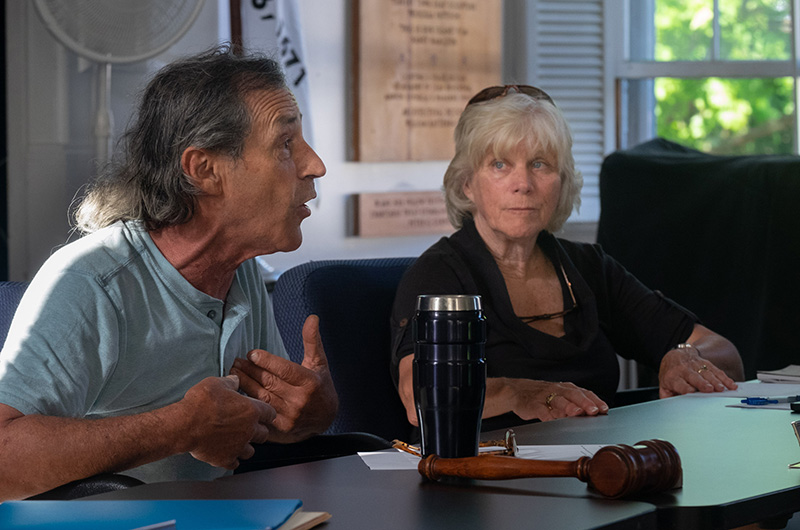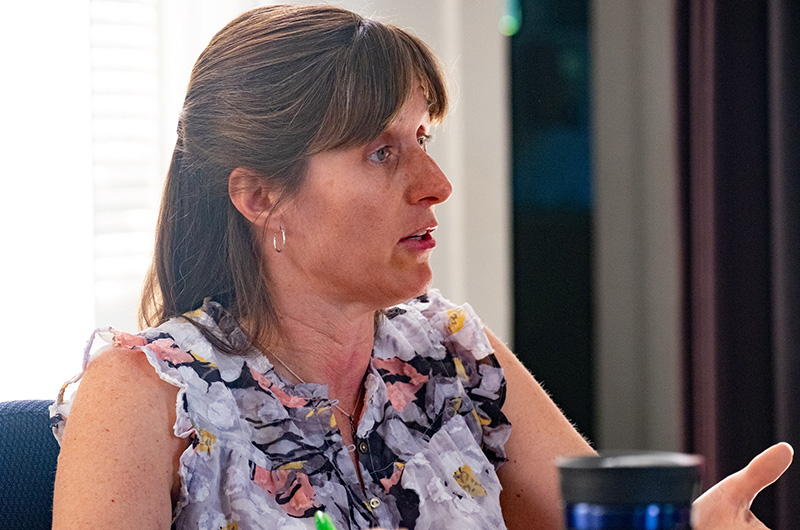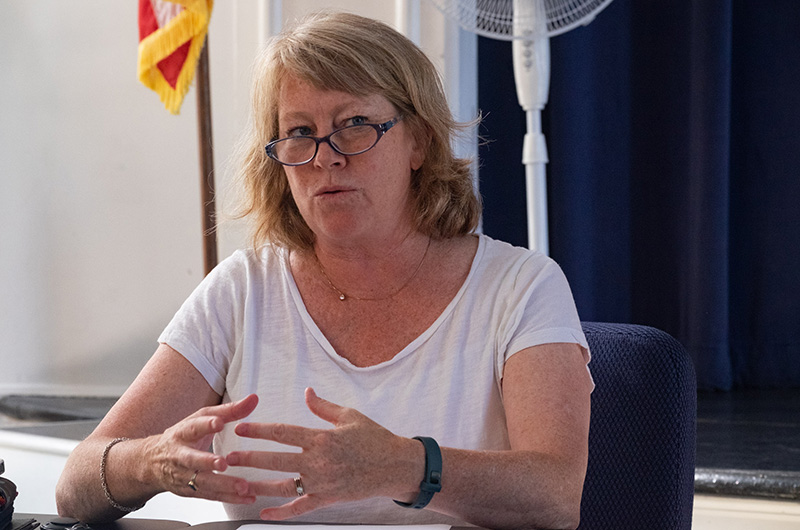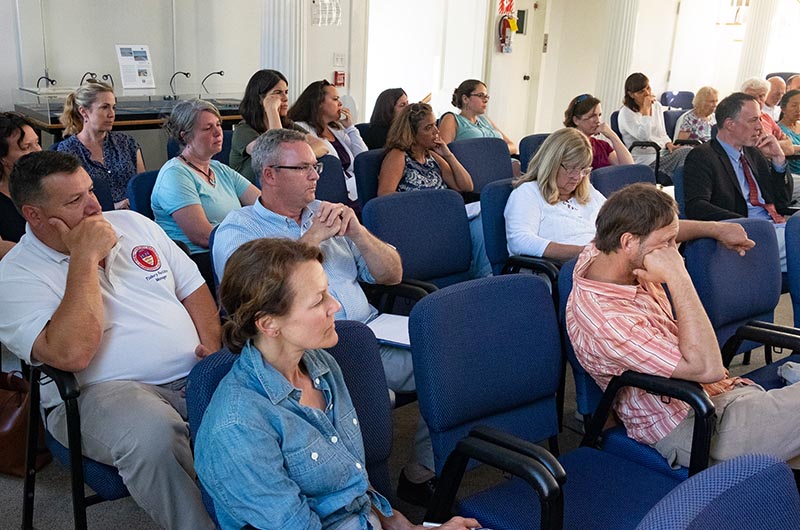With the failed plan for a new elementary school behind them, Tisbury selectmen and members of the school committee took the first tentative steps to chart a path forward this week.
“Our goal tonight is really to put some forward motion on what we can do, and what would be a good way to go about that,” said school committee chairman Amy Houghton, who led the joint meeting held at the Katharine Cornell Theatre Tuesday.

It marked the first formal meeting between selectmen and the school committee since the $46 million Tisbury school building proposal failed by 21 votes at the annual town election in April.
And while many at the meeting echoed Ms. Houghton’s desire to move forward, there was a struggle to find common ground in a room filled with teachers, parents, and former school building committee members who remain sharply critical of the selectmen for their lack of support for the original project.
Selectman and board chairman Tristan Israel presented a mission statement for a new building needs study committee.
“I gave it a lot of thought as to how we might start the process again,” Mr. Israel said.
He suggested the new committee include Tisbury school principal John Custer, selectman James Rogers, architect, builder and parent Reade Milne, planning board member Cheryl Doble and Ms. Houghton.
He proposed that the committee be charged with considering next steps, possibly including another application for support from the Massachusetts School Building Authority (MSBA) in April of next year. The MSBA sponsors capital projects for a limited number of qualifying school districts, and had pledged more than $14 million for the school project that in the end was not approved by voters. In his statement, Mr. Israel also suggested limiting the budget for the new project to $27 million.
Tisbury School principal John Custer asked where $27 million came from.
Mr. Israel said he and selectman Melinda Loberg had settled on the number.

“It’s just a number, but it would at least make that bite a little less on taxpayers,” Mr. Israel said. He later added: “We are a very diverse community, we have a lot of elderly. There needs to be a lot of conversation of how we can afford to move forward.”
School committee member Colleen McAndrews, who led the school building committee in an exhaustive process for the past two years, said a $27 million budget would immediately preclude building a new school.
“Twenty-seven million is very concerning because it means there is no new construction option,” Mrs. McAndrews said. “You can’t take a $46 million project and take $20 million off and solve the problem.”
She asked selectmen to be clear at the outset if they were against demolishing the existing building. Mr. Rogers said later he would prefer to renovate the existing building rather than build new. Mrs. Loberg and Mr. Israel did not directly respond, but said a renovation addition option should be seriously considered.
And some took issue with the suggestion of reapplying to the MSBA, especially if selectmen were not open to all possibilities, including building a new school.
“Including the MSBA [in the mission statement] is fine,” said Ms. Houghton. “But there has to be a genuine interest from selectmen to go by that process.”
“If you’re not willing to follow MSBA guidelines, then don’t bring us down path again,” said Rita Jeffers, a teacher at the Tisbury School. “It was embarrassing to turn down $14 million [in state support], and teachers and students don’t want that.”
Mrs. McAndrews reminded the group that the MSBA requires starting at square one.
“Unless something is different before next April, I wouldn’t support applying because why would the outcome be different,” she said.

Superintendent of schools Dr. Matthew D’Andrea agreed. “I don’t think applying to MSBA is going to be fruitful,” he said. He noted that much groundwork has already been laid through an $825,000 feasibility study done for the recent project.
“We’ve gone over the facility needs of the building and the educational needs of the kids. We have all that information, and we have an educational plan and some designs of buildings that meet those needs,” Mr. D’Andrea said.
Meanwhile, the ailing school physical plant needs immediate attention. Mr. Custer said the building envelope, ventilation systems and mold are all concerns. School committee members have also called for improvements to an outside modular unit used for some classes due to the severe space crunch in the main building.
There were questions about how short-term projects will be prioritized and paid for while a long-term plan is developed.
“I think we have to be really careful that we don’t put five years of bandaids on this building,” said Harold Chapdelaine, a member of the former school building committee. He cautioned that the cost of the temporary fixes could add up.
Mr. Custer agreed. “Some of these things identified through the feasibility study — by professionals, not by me — these are huge jobs,” he said. “These are not things we can do before June 30 [the end of the fiscal year], not things we can do this summer, and not things we can do while kids are in the building.”

Ms. Houghton said it is crucial for teachers and educators to play an active role in the plan for the new school, whatever form it takes.
“We have to start with people who do education. We have to have faith that they know and they do that job every day” she said.
Reade Milne, who also served on the school building committee for the failed project, was skeptical about joining the new committee.
“It feels daunting to be asked to serve on an exploratory committee that has very loose, if any, parameters,” she said.
Ms. Houghton, who was also asked to serve on the committee, agreed, noting the need for clarity and a speedy time frame.
“I would hope that this is a committee that could make recommendations so we could have something for town meeting next year,” she said.
Ms. Houghton and the school committee agreed to revise Mr. Israel’s mission statement and bring it back to selectmen for another round of talks.
She emphasized that there is no time to waste.
“We need to stay on this wave of enthusiasm about doing something for the school,” Ms. Houghton said.







Comments (6)
Comments
Comment policy »